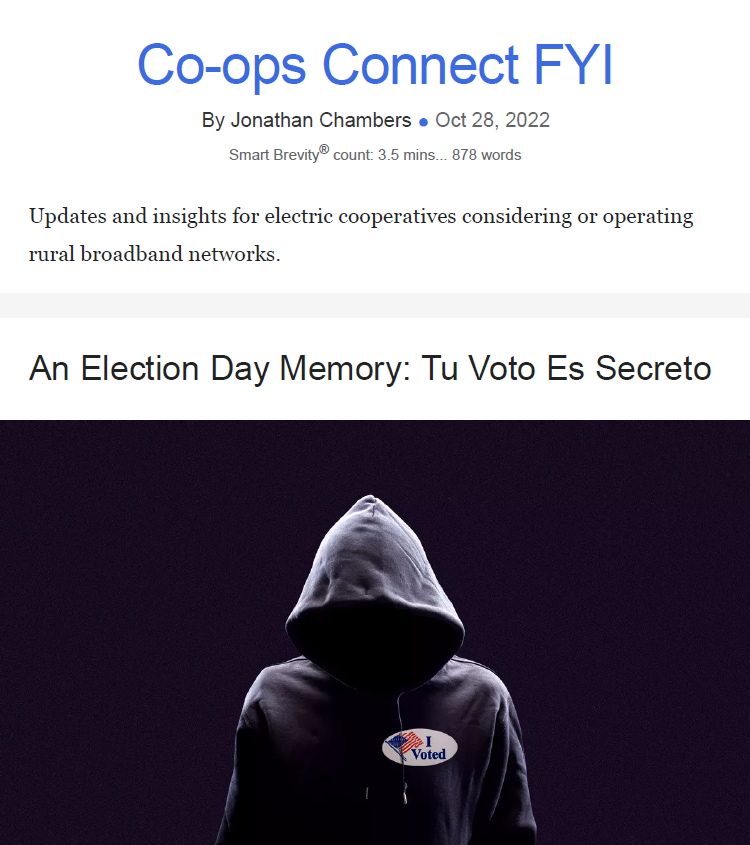An Election Day Memory: Tu Voto Es Secreto
October 28, 2022
As Election Day approaches each year, I often think back to my experience as an official election observer in the 1990 Nicaraguan elections.
I was part of an observer team assembled by former President Carter, who wrote of the election:
“For the first time in Nicaragua, power was transferred peacefully from the incumbent to a rival after a free and fair election. And for the first time in the world, a revolutionary regime that came to power through armed struggle turned over control of the government to its adversaries as a result of voters' choice. The elections in Nicaragua were truly a historic moment for democracy.”
My involvement was happenstance. At the time, I was a staff member of the U.S. Senate Select Committee on Intelligence.
- In that position, I worked for Senator Danforth (R-MO) and Senator Boren (D-OK), and reported to George Tenet, who later became Director of Central Intelligence.
- Carter had invited Danforth to join his election monitoring team and accompany him on pre-Election Day trips to Nicaragua.
The Bush Administration was skeptical of the elections and had refused to provide election monitors.
- Danforth’s participation was somewhat at odds with the White House.
- The White House was concerned the election would be rigged and Carter’s observers would legitimize a fraud.
- When the opposition party won, the Bush Administration was thrilled, but we had some tense conversations with them in the months leading up to the voting.
My position on the Intelligence Committee gave me access to military aircraft but only if I was part of the trip.
So, I arranged for the transport of the U.S. delegation and thus became part of the monitoring team.
Recollections From Nicaragua
What stands out in my memory about the 1990 election:
1. A poster I saved from the election that assures voters: Tu Voto Es Secreto. (Your vote is secret).
Nicaragua was run by a repressive, communist government, so the promise of secret ballots was essential.
Think, by contrast, of the recent sham voting in the parts of Ukraine occupied by Russia.
2. The optics of the voting process, start to finish.
- My observer territory was in rural Nicaragua.
- From early morning until late day, long lines of voters patiently waited to cast ballots.The vote counting was serious, solemn, and generally without incident.
3. Carter’s leadership throughout the experience.
- Carter was deeply engaged, playing a mediating role between the parties at times and a leadership role among the observers, which included the UN and Organization of American States.
- Whatever his shortcomings as president, Carter has performed admirably in the service of others, especially in that 1990 election.
The greater outcome:
- As important as the voting, the communist and thuggish Sandinista government transferred power peacefully to an opposition party led by Violetta Chamorro.
- The peaceful transition of power away from communist governments had started in Eastern Europe and was spreading.
What it taught me:
I became an ardent believer in the democratic process as an antidote to the Cold War.
- I had a front-row seat as witness to the end of the Cold War.
— Three months prior to Nicaragua, I had been in Berlin observing the Wall being torn down.
— Earlier in the year, I had been in Poland and Czechoslovakia as well.
— Later in the year, I was involved in discussions that led to elections and an end to the civil war in Cambodia.
- My personal observations in Europe, Asia, Africa, and Central America made me a believer in the transformational power of the democratic process.
The Democracy of Cooperatives
What does all of this have to do with broadband and electric cooperatives?
One of the aspects I admire about co-ops is the adherence to democratic decision-making.
- Every member can vote.
- Voting can influence the direction of a co-op.
One example:
When the former CEO of New Hampshire Electric Cooperative (NHEC) was hostile to co-op involvement in broadband, a member petition and member voting changed minds. Starting with Sandwich, New Hampshire, member participation and member voting changed the direction of NHEC.
- Now, NHEC is committed to building a fiber network to every member.
- NHEC’s new CEO was one of the early visionaries of rural co-op broadband.
The big picture:
Broadband is a management and board decision — which is to say: It is ultimately a member decision.
- Every electric cooperative can build a fiber network to serve its members.
- For such a large commitment of time and resources, that’s the right place for such a decision – with the members.
The Final Word
I, for one, have grown tired in recent years of people running down America. The democratic process is still the best form of governance. It is one of our nation’s gifts to the world.
As a nation, we sometimes forget that what binds us together is so much greater than that which divides us.If 1990 Nicaragua can manage to hold free and fair elections, the 2022 United States of America can and will.
Vote.
